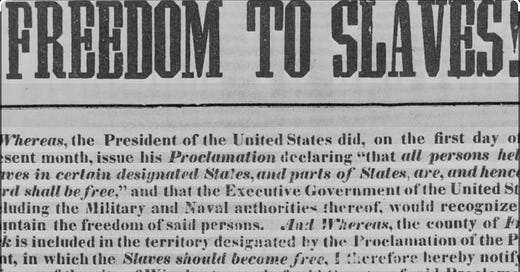Enough with the Juneteenth
It's not even good history. Trump should junk the Federal holiday tomorrow.
On June 17, 2021, President Joe Biden declared “Juneteenth” a federal holiday. Juneteenth is a portmanteau of the words “June” and “nineteenth,” June 19,1865 being the day when the last slaves were freed in Texas under the authority of President Abraham Lincoln’s 1863 Emancipation Proclamation. It was not until the arrival of the Union Army in Galveston, Texas and the issuing of General Order #3 that many slaves—and their slaveowners—received the news of their emancipation. The celebrations that followed enforcement of the edict became a tradition, celebrated each year since 1866 within the black community.
It is a bit of an irony that the day set aside to celebrate the end of slavery in the United States emanates from the actions of a president whose reputation as the Great Emancipator has suffered in recent years. The race-baiters on the left, who know nothing of history and therefore approach every historical figure with the subtlety of a sledgehammer in a china shop, have declared Lincoln a racist. Not only did Lincoln make racist remarks while on the campaign trail[1], he denied that ending slavery was his sole purpose once he became president.[2] The Emancipation Proclamation itself was enacted under President Lincoln’s powers as commander-in-chief, “as a fit and necessary war measure,” as every slave who was emancipated weakened the Southern military cause. However, even this attenuated anti-slavery measure was further limited by the fact that Lincoln’s Proclamation applied only to those states then in rebellion and did not reach the slave populations in those border states that remained loyal to the Union. The reason for the distinction was political and prudential: Lincoln could not afford to alienate border states as their support was critical to the success of the Union Army and to the prospects of a Northern victory.
Lincoln’s personal opposition to slavery was consistent throughout his life; yet his public announcements and actions seem rather ambiguous and inconstant. He believed that slavery violated the fundamental principle of human equality, a condition which Lincoln believed included all human beings. This recognition of human equality formed the basis for the right of self-government, which was negated once one race claimed a superiority over another:
“When the white man governs himself, that is self-government; but when he governs himself and also governs another man, that is more than self-government—that is despotism.” [3]
Nevertheless, throughout his political career and into his presidency, Lincoln was willing to tolerate slavery where it existed—because slavery enjoyed limited protection in the Constitution[4] and because the evils that would come from sudden emancipation were likely to be devastating.[5] Whatever evolution might have occurred in Lincoln’s attitude toward abolishing slavery, it is clear that Lincoln’s guiding purpose remained the same, i.e., that the nation founded upon the principles of the Declaration of Independence which sprang from the self-evident truth of equality must be maintained on those principles. Slavery could be tolerated in the places where it existed, as long as it was understood to be a necessary evil, placed on the course of ultimate extinction. This the South could not abide, and so secession and war followed. Lincoln, like the framers of the Constitution, understood that only a constitutional regime committed in principle to equality and self-government could create the conditions where slavery would be abolished.
As the Civil War raged, the devastation and destruction, especially throughout the Southern states, was far more extensive than what could have been imagined by the abrupt emancipation of slaves. Moreover, sentiment throughout the Northern states moved steadily against the institution of slavery, connecting the Union cause with the need to abolish slavery. As such, all of the prudential arguments against the abolition of slavery began to be superseded by events. Beginning in early 1864, President Abraham Lincoln and abolitionist Republicans saw an opportunity to abolish slavery—permanently and universally throughout the United States. Because the Emancipation Proclamation had been a limited wartime measure enacted under limited constitutional powers, a constitutional amendment was needed to abolish slavery entirely and irrevocably across the United States. On April 8, 1864, after intense debate, the Senate passed the proposed 13th Amendment with a vote of 38-6.
“Neither slavery nor involuntary servitude, except as a punishment for crime whereof the party shall have been duly convicted, shall exist within the United States, or any place subject to their jurisdiction.”
The House of Representatives proved a tougher battleground. Democrats, particularly those from border states and northern areas with pro-slavery sympathies, opposed the amendment, arguing it infringed on states’ rights or would still disrupt the social order. In June 1864, the House vote fell short of the two-thirds needed, with 93 in favor and 65 against. Undeterred, Lincoln and his allies, including radical Republicans like Thaddeus Stevens, made the amendment a central issue in the 1864 election. Lincoln’s reelection and Republican gains in Congress bolstered their cause. Lincoln, leveraging his political capital, worked behind the scenes to secure votes. His administration engaged in intense lobbying, offering patronage and political favors to wavering Democrats. On January 31, 1865, the amendment passed the House 119-56, just over the two-thirds threshold.
Ratification by the states followed swiftly. By December 6, 1865, Georgia became the 27th state to ratify, meeting the necessary three-fourths requirement. The13th Amendment was certified as part of the Constitution on December 18, 1865.
Slavery was a horrible stain on the constitutional history of the United States and a violation of its most sacred principles. It was the cause of immeasurable human suffering: a day to reflect upon its tragic legacy and celebrate its abolition is therefore fitting. This is especially so given the relative triviality of other federal holidays like Labor Day or even President’s Day. But the decision to make Juneteenth the federal holiday that celebrates the end of slavery America makes no sense—other than as Biden’s typical pandering to the left amid the racial hysteria caused by the George Floyd riots in the summer of 2020.
President Donald Trump should rescind Joe Biden’s executive order making Juneteenth a federal holiday, and replace it with December 13th, the anniversary of the day that slavery was abolished in the United States forever. That is a day worth a federal holiday.
[1] “I am not, nor ever have been, in favor of bringing about in any way the social and political equality of the white and black races, [applause]-that I am not nor ever have been in favor of making voters or jurors of negroes, nor of qualifying them to hold office, nor to intermarry with white people; and I will say in addition to this that there is a physical difference between the white and black races which I believe will forever forbid the two races living together on terms of social and political equality. And inasmuch as they cannot so live, while they do remain together there must be the position of superior and inferior, and I as much as any other man am in favor of having the superior position assigned to the white race.” The Collected Works of Abraham Lincoln, ed. Roy P. Basler, vol. 3 (New Brunswick, NJ: Rutgers University Press, 1953), 145-146.
[2] “I would save the Union. I would save it the shortest way under the Constitution. The sooner the national authority can be restored; the nearer the Union will be “the Union as it was.” If there be those who would not save the Union, unless they could at the same time save slavery, I do not agree with them. If there be those who would not save the Union unless they could at the same time destroy slavery, I do not agree with them. My paramount object in this struggle is to save the Union, and is not either to save or to destroy slavery. If I could save the Union without freeing any slave I would do it, and if I could save it by freeing all the slaves I would do it; and if I could save it by freeing some and leaving others alone I would also do that. What I do about slavery, and the colored race, I do because I believe it helps to save the Union; and what I forbear, I forbear because I do not believe it would help to save the Union.… I have here stated my purpose according to my view of official duty; and I intend no modification of my oft-expressed personal wish that all men every where could be free.” Letter to Horace Greeley, August 22, 1862, Id at vol 5, 388.
[3] “Speech on the Kansas-Nebraska Act at Peoria, Illinois,” October 16, 1854, Id vol 2 at 266.
[4] “It may be argued that there are certain conditions that make necessities and impose them upon us, and to the extent that a necessity is imposed upon a man he must submit to it. I think that was the condition in which we found ourselves when we established this government. We had slavery among us, we could not get our constitution unless we permitted them to remain in slavery, we could not secure the good we did secure if we grasped for more, and having by necessity submitted to that much, it does not destroy the principle that is the charter of our liberties. Let that charter stand as our standard.” Id at 274–275.
[5] “When it is said that the institution exists; and that it is very difficult to get rid of it, in any satisfactory way, I can understand and appreciate the saying. I surely will not blame them for not doing what I should not know how to do myself. If all earthly power were given me, I should not know what to do, as to the existing institution.” Ibid.






"June 19,1865 [is] the day when the last slaves were freed in Texas under the authority of President Abraham Lincoln’s 1863 Emancipation Proclamation." From today's perspective, the amazing part is no federal judge enjoined the Emancipation Proclamation nationally. And if one had, SCOTUS would have then outlawed the practice then, sparring us of the current tyranny.
I'm a staunchly conservative, religious Republican, have been all my life, and I disdain the philosophy and celebrations of the modern "social justice" movement. However, I think Juneteenth is a far more worthy celebration than Civil Rights Day, though it's a worthy celebration too. Two and a half million Union soldiers fought to enforce the emancipation of slaves. 360,000 died and 275,000 were wounded for the cause. I think it's a noble accomplishment to celebrate despite the nauseating canards about "inclusion" by mindless leftists who have no idea about real inclusion, grace, and acceptance, and who overlook the actual, terrible sacrifices of Americans to end this cruel practice. The leftists don't own this holiday. Americans do, especially Republicans who are members of the party that was founded to end slavery.